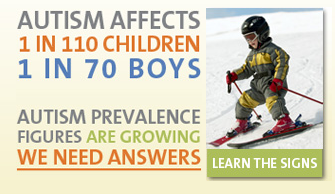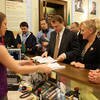Clifford Odets always makes me think of the opening of the Coen Bros.' Barton Fink, John Turturro listening offstage to impassioned lines like:
Not this time, Lil! I'm awake now, awake for the first time in years. Uncle Dave said it: Daylight is a dream if you've lived with your eyes closed. Well my eyes are open now! I see that choir, and I know they're dressed in rags! But we're part of that choir, both of us--yeah, and you, Maury, and Uncle Dave too!"
And then comes the call of the fishmongers.
It's an affectionate shot to the ribs, but what you learn watching Intiman's Paradise Lost (through April 25, tickets here) is that Odets was--as any great playwright is--overflowing with voices, not just firebrands urging revolutionary singalongs. Yes, he was also a bubbling fountain of what Arthur Miller called "unashamed word-joy" but a good deal of the joy (and words) came from what he heard around him. How people speak in Paradise Lost is often how they spoke--"Have a piece of fruit," "Do yourself a personal favor," "We're like that for each other"--with no adornment; it's in the soliloquies (arias, really) that the language takes wing and the words sing.
Dramatically, not much separates Paradise Lost from a Chekhov play. An upper middle-class family, the Gordons, is coasting slowly to the end of their charmed, aristocratic life, unable to adapt to the social upheaval all around them. As the play begins, in 1933, the cracks produced by the Depression are just starting to show in the solid walls of their home. (That's my metaphor--the set by Tom Buderwitz actually features a trompe l'oeil scrim of brick and siding that, with L.B. Morse's lighting, exposes a disturbing insubstantiality to the Gordon home.)...
 From the Autism Speaks website
From the Autism Speaks website
Sallie Tisdale has an article in Harper's (subscribers only) this month about her autistic daughter. There's an element of forestalled explanation to it; yes, she said "daughter."
My daughter, Annie, still lives with us. She is twenty-six now and at the moment is sitting on the porch, looking out at the street. Soon she will come in and pace for a while, her head down. Later she will read the first few pages of a book—the same book, the same pages, that she read last week and the week before, and will read again tomorrow.
"Autistic son" delivers 175,000 results on Google. "Autistic daughter," just 31,000. People are not sure why more boys than girls are found to have autism. Epidemiologically, the ratio is supposed to be about 3.6 boys to one girl.
It's known that girls can learn to mask some of the effects of autism more easily than boys, so it's possible that they are under-diagnosed in general. Studies show that hallmarks like "language deficits, tantrums, and aggression are all less common in girls than boys in the general population." A British researcher raises the specter of a shadow population of "shy" girls who like to keep lists and count calories (even to anorexia).
Tisdale's story is a primer on autism's variability, and its effects on everyone who struggles with it, including caregivers. Tisdale recounts the lifelong challenge of it: the official optimism with which her daughter was handed off as she finished school, the time her daughter started hallucinating and had to be given antipsychotic medication. Writes Tisdale:
Long-term studies of people with autism are not reassuring. Autistic adults generally read poorly, have few math skills. Very few go to college, are employed, or lead independent lives. The majority say they have no friends....
(more)
Actor and writer Brian Copeland
"In talk radio, letters that come to you through snail-mail, they're only from two groups: old ladies, who have the return address labels that are pre-printed, and handwritten letters from nuts. And this was type-written with a typewriter, and that's what grabbed my attention. Because the first thing I did was laugh. I mean, where the hell did you find ribbon?" Brian Copeland told me over the phone last week with a chuckle, as he was leaving a UPS Store near his Bay Area home, on a quick errand sending books to his daughter who'd just gone back to college."Here's the letter verbatim," he continued, "as it was written, unsigned: 'As an African-American, I'm disgusted every time I hear your voice because you are not a genuine black man.'"
That letter, and the phrase it provided—not a genuine black man—have long since become famous across the nation, having reached Copeland at just the right moment. A long-time comedian, writer, and Sunday morning radio talk-show host in the Bay Area, Copeland was looking for a way to create a longer work, and that insult proved to be just what he needed. His solo show that took that phrase as its name debuted in 2004 and became the longest-running one-man show in San Francisco history, with runs in New York and Los Angeles to boot. His 2006 memoir, Not a Genuine Black Man: My Life As an Outsider, became a bestseller and has been adopted at high schools, colleges, and city-reads programs around the country. And this weekend only, Seattle has the chance to see Copeland, who is bringing Not a Genuine Black Man to Theatre off Jackson for four performances, produced by Backwards Ensemble Theatre Co. (Feb. 11-14, tickets $25 sliding scale/$15).
And all because of an anonymous insult. It's true that in a lot of ways, Copeland doesn't conform to the African-American norm. He's Catholic (just 3 percent of US Catholics are black), his comic heroes include decidedly white humorists like Carl Reiner, and much like the president, his diction makes him too "white" for some blacks. "Barack Obama went through this," Copeland pointed out. "The first debate, on YouTube, first questions was, 'Are you black enough?' First question. And his answer was, 'Well, I can't get a cab.'"...



Most Recent Comments